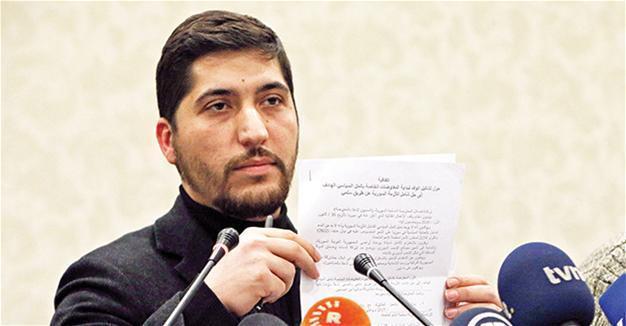13 groups have signed cease-fire deal: Syrian opposition representative
Sevil Erkuş - ANKARA

AP photo
The Syria-wide cease-fire agreement has been signed by 13 armed opposition groups, Osama Abou Zaid, a representative from the Syrian opposition’s truce negotiating team, told reporters late on Dec. 29.
The agreement, that is two-page-long and consists of five articles, covers all regions in Syria and applies to all opposition groups, he said.
“All group commanders in Syria approved the agreement. There were 13 opposition factions on the ground, in which they all signed,” he said.
The cease-fire, however, does not include the Islamic State of Iraq and the Levant (ISIL) and People’s Protection Units (YPG), according to Zaid.
The Russian Defense Ministry listed seven of the main rebel groups included in the truce as; Faylaq al-Sham, Ahrar al-Sham, Jaysh al-Islam, Thuwwar Ahl al-Sham, Jaysh al-Mujahidin, Jaysh Idlib and al-Jabhah al-Shamiyah.
Yet, Ahrar al-Sham, announced it was not a part of the truce.
Turkish leaders stated that Jabhat Fateh al Sham, formerly known as al-Nusra was excluded from the truce deal. However, the group is linked to other groups based in Idlib that pledged to the deal.
An official giving information on the negotiations said that the regime did not want to include East Ghouta in the deal but opposition groups there refused the decision and insisted the truce would cover the entire country.
During the talks, the opposition representatives said Aleppo was bombed merely because 200 members of Jabhat Fateh al-Sham argued that it was not possible to exclude the group and that the ceasefire should cover the entire country as their influence is present in different regions.
Russia is guarantor for both al-Assad regime and Shiite militias
The guarantors of the deal would be Turkey and Russia, which the latter accepted to be the guarantor of Bashar al-Assad’s regime and Iranian Shiite militia groups to act in coordination with the regime.
40 groups are fighting for the regime and Russia will be their guarantor and Turkey is backing Syrian opposition groups to withdraw Shiite militias in Syria, Zaid added.
“Shiite groups will eventually retreat from Syria, they are occupants,” he stated.
He said the truce deal was intended to pave the way for new talks in Astana, with the High Negotiations Committee representing the Syrian opposition. Other Syrian opposition figures that had talks with the regime earlier in Cairo, Moscow and Astana, will not be part of this negotiation team.
Asked if any Syrian Kurdish groups that are rivals to the YPG and Democratic Union Party (PYD) could be represented in the Astana negotiations, Zaid said that it was “possible.”
“Russia and Iran disagreed over the implementation of that agreement, but Russia assured us they would take Shiite militias and regime forces under its guarantee,” he said.
The peace talks will be based on the Geneva 2012 declaration that called for a transitional governing body with full executive powers to run affairs in Syria during the transitional period, which meant that there will be no presence for al-Assad in the future, he added.
